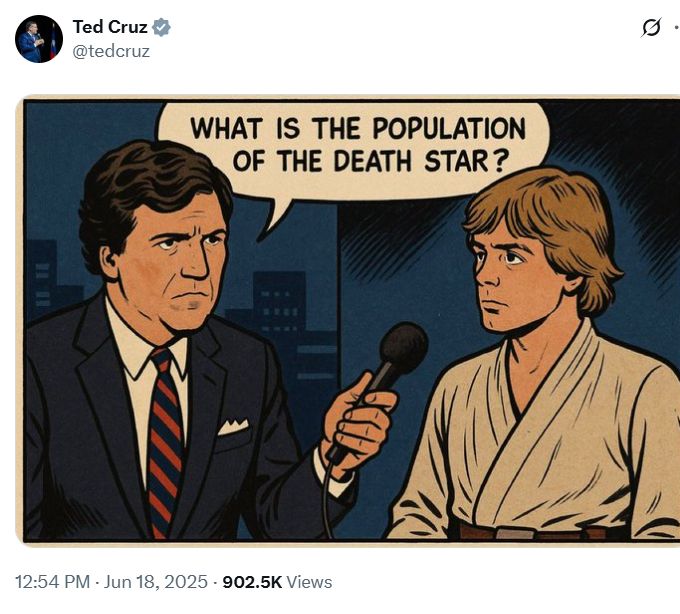If you were wondering why liberals have been reluctantly saying nice things about Tucker Carlson
West Coast Stat Views (on Observational Epidemiology and more) 2025-06-20
Tucker Carlson and Ted Cruz on Israel and theology. [image or embed]
— Yashar Ali 🐘 (@yasharali.bsky.social) June 18, 2025 at 9:53 AM
For about as long as we've had this blog, I've been meaning to write a post arguing for a moratorium on social science research using the idea of a left–right political spectrum. If you sat down and tried to come up with a metric that was badly defined, uninformative, and created an illusion of understanding, you'd be hard-pressed to come up with anything worse—and if you were looking for the worst possible place to apply this metric, it would be on the issue of war. Over the past century, we've gone through pretty much every possible permutation involving conservatives, liberals, and the left—including my personal favorite in the late ’30s, when liberals were pro-war, and leftists and conservatives were isolationists. If that weren't enough, you frequently have periods where the divisions are remarkably bitter but are primarily found within ideological groups. Especially since the Iraq War, the naïve tendency to equate anti-war with “liberal” has led to some often disastrous results—giving figures like Ron Paul and Tulsi Gabbard an illusion of being something special, and obscuring the role that the anti-war movement played in the rise of Trump. Trump’s anti-war positions were always more opportunistic than anything else, as Josh Marshall points out here:WATCH: “You’re a U.S. senator and you don’t know anything about the country you want to topple.”Tucker Carlson embarrasses @sentedcruz as he pushes for war with Iran [image or embed]
— The Tennessee Holler (@thetnholler.bsky.social) June 17, 2025 at 6:17 PM
But that doesn’t mean that the anti-war movement on the right isn’t real, or that it’s trivial or easily dismissed. One of the many complications here is the extent to which Putin has come to influence MAGA and the Republican Party of 2025, with a significant segment feeling considerable personal loyalty to the Russian dictator. While the situation is enormously complex and opaque, it’s probably worth noting that two of Putin’s most reliable hand puppets—Carlson and Gabbard—have both been on the "leave Iran alone" side. Does this make it more or less likely that Trump will get us into another war? Yes.The idea that Trump or MAGA is in any sense “anti-war” is something between an absurdity and a misunderstanding. Kate and I had a good discussion of it in this week’s podcast. At one level it’s a simple fraud. Trump claimed he’d always been against the Iraq War at a time when the U.S. had been bogged down in Iraq and Afghanistan for years. It was a helpful attack line and it was completely false. Trump wasn’t in politics in 2002 or 2003 and to the extent he said anything, like a lot of people, he was for it when it was popular and against it when it wasn’t.
During his presidency he signed off on the assassination/targeted attack that killed Qasem Soleimani; he heavily involved the U.S. in the Saudi war in Yemen; he maintained or expanded the U.S. fight against ISIS in Iraq/Syria. Those are at least a continuity with the Obama years and in key respects an expansion of it. The one arguable exception is the deal Trump made with the Taliban to leave Afghanistan — a bad deal which Joe Biden was saddled with and followed through on and was endlessly criticized for, by Trump more than anyone else. Afghanistan captures Trump perfectly — his one notionally “anti-war” position was continuity by definition. And he turned against it as soon as he was unpopular. Trump has gotten “anti-war” mileage out of his opposition to Ukraine aid. But that’s pro-Russia rather than anti-war.
So the entirety of Trump’s anti-war-ness is a fiction and one he’s been remarkably adept at selling to a huge swath of the political and journalistic community. He came into politics at a moment of profound public fatigue with unending military commitments in Afghanistan and Iraq and simply passed himself off as against what everyone was sick of. That’s just a subset of most of the rest of Trump’s politics: he’s the diehard against whatever is unpopular and vice versa, rinse and repeat ad finitum, or until the public mood changes.
